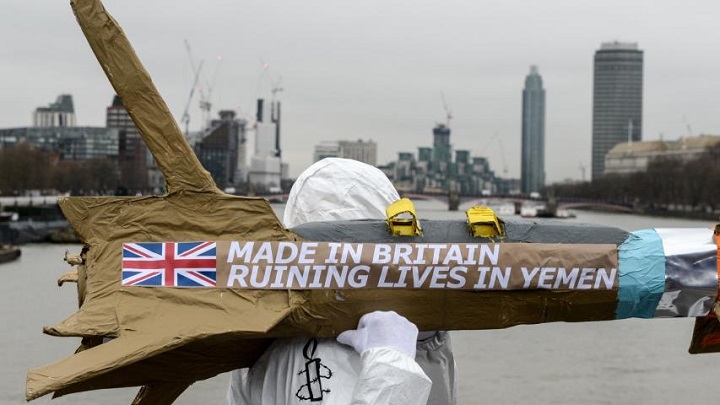UK’s True Role in Yemen’s Deadly War
YemenExtra
SH.A.
According to al-masirah.net, the Guardian has highlighted in a report written by Arron Merat the role of the United Kingdom in the deadly war on Yemen and the court’s decision on British arms exports to Saudi Arabia, which he said were illegal exports.
“Every day Yemen is hit by British bombs – dropped by British planes that are flown by British-trained pilots and maintained and prepared inside Saudi Arabia by thousands of British contractors,” he said.
Merit also referred to the shaky allegations made by British Prime Minister Jeremy Hunt and his statement that the United Kingdom is not a party to the Yemeni conflict, despite deploying RAF personnel to work as engineers, and to train Saudi pilots and targeteers.
“Under British law, it is illegal to license arms exports if they might be used deliberately or recklessly against civilians – or in legal terms, to violate international humanitarian law,” the report said. There is overwhelming evidence that the Saudis are flagrantly in violation, including air raids against schools, hospitals, markets, farms, and food storage sites, far from any military objective. War crimes are borne by British service personnel, including RAF liaison officers based in command and control centers in Saudi Arabia, it added.
The writer quoted a range of views regarding the British intervention to support Saudi Arabia in its war on Yemen, where Mark Latimer, Executive Director of the Center for Civil Rights Ceasefire said that in Iraq, Syria, and Yemen the UK government adopted a strategy to achieving military objectives (through or with) partner forces, while this strategy may limit the military exposure of the UK forces, but it should not limit the responsibility of the United Kingdom for assisting devastating violations against civilians.
“The Saudi bosses depend on BAE Systems,” Merat quoted John Deverell, a former MoD mandarin and defense attache to Saudi Arabia and Yemen, as saying. “They couldn’t do it without us.” A BAE employee recently put it more plainly to Channel 4’s Dispatches: “If we weren’t there, in seven to 14 days there wouldn’t be a jet in the sky.”
The report indicated that the British bombs that rain down on Yemen are produced in three towns: Glenrothes in Scotland, and Harlow and Stevenage in south-east England. Bombs roll off production lines owned by Raytheon UK and BAE Systems, firms contracted by the government to manufacture Paveway bombs (£22,000 apiece), Brimstone bombs (£105,000 apiece), and Storm Shadow cruise missiles (£790,000 apiece) for the Saudi Royal Air Force. BAE, under a government contract, also assembles the jets that drop these bombs in hangars just outside the village of Warton, Lancashire.
Once these weapons arrive in Saudi Arabia, Britain’s involvement is far from over, it added. “The Saudi military lacks the expertise to use these weapons to fight a sustained air war – so BAE, under another contract to the UK government, provides what is known as “in-country” services. In practice, this means that around 6,300 British contractors are stationed at forwarding operating bases in Saudi Arabia.”
There, the report said, they train Saudi pilots and conduct essential maintenance night and day on planes worn out from flying thousands of miles across the Saudi desert to their targets in Yemen. They also supervise Saudi soldiers to load bombs on to planes and set their fuses for their intended targets.
Around 80 serving RAF personnel work inside Saudi Arabia. Sometimes they work for BAE to assist in maintaining and preparing aircraft. At other times they work as auditors to ensure that BAE is fulfilling its Ministry of Defence contracts. Additional RAF “liaison officers” work inside the command-and-control center, from where targets in Yemen are selected.

